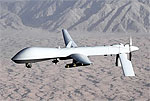Predator shootdown raises questions about Syrian air threat
 The U.S.-led coalition in Southwest Asia is confident in its ability to conduct flights over Syria without coordinating with the Assad regime, even after a U.S. Predator remotely piloted aircraft was shot down earlier this year.
The U.S.-led coalition in Southwest Asia is confident in its ability to conduct flights over Syria without coordinating with the Assad regime, even after a U.S. Predator remotely piloted aircraft was shot down earlier this year.
U.S. Central Command, in a statement to Air Force Times on Tuesday, refused to provide specifics about the threat level of air defenses in Syria, but said, "The coalition is confident in its ability to conduct air operations as needed in Syria and we are doing so without coordinating or communicating with the Assad regime."
The statement does not go as far to say that Syrian air defenses are permissive or turned off during U.S. operations, as military officials have told reporters throughout Operation Inherent Resolve.
Central Command's statement comes after the Air Force publicly acknowledged last week that an MQ-1B Predator, assigned to U.S. European Command, was shot down near the coastal town of Latakia in Western Syria. EUCOM told Air Force Times in a statement Tuesday that the loss of the Predator was the result of errors in command and control and mistaken mission approval. EUCOM did not explicitly state how the aircraft went down but did not mention any mechanical issues.
EUCOM said that following the March 17 loss of the aircraft, it has overhauled its mission approval process for remotely piloted aircraft flights and mandated mission rehearsals.
The remotely piloted aircraft was assigned to European Command but operating in Syria, as opposed to the majority of aircraft flying in the operation that are assigned to Central Command. The closest base hosting Predators under EUCOM is Incirlik Air Base, Turkey.
The shootdown came as U.S. officials had been negotiating with the Turkish government to use the base for flying operations in support of Operation Inherent Resolve. The Turkish government had allowed training on the base, but not flight operations, including strikes and combat search and rescue.
EUCOM commander Air Force Gen. Philip Breedlove told the Senate Armed Services Committee in April that his command has been working with Turkey on "key things" about expanding Incirlik's role in the operation. The training and equipping mission at the base was up and running, but Breedlove refused to speak publicly about negotiations to expand flying operations at the base.
Incirlik is home to the 414th Expeditionary Reconnaissance Squadron, which has flown the MQ-1B since 2011.